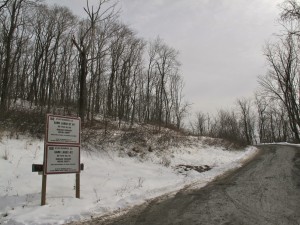2014: DEP stepped up enforcement of industry with hefty fines
-
Susan Phillips

Katie Colaneri/StateImpact Pennsylvania
The entrance to the Chevron well pad where a natural gas well exploded in Dunkard Township, Greene County last February killing a worker. DEP has not yet issued a fine. The company blocked DEP inspectors from accessing the site for two days after the incident.
Pennsylvania’s Department of Environmental Protection ended the year with some pretty large lumps of coal for a few misbehaving natural gas drillers. And those penalties contrast sharply with previous years.
In September, the DEP issued a $4.1 million dollar fine against driller Range Resources – the highest penalty it has levied against a driller. The agency then stepped up the price tag in October against driller EQT, announcing plans to seek a $4.5 million dollar penalty. And just this last week state environmental regulators announced a nearly million-dollar fine against the independent driller Vantage Energy for a landslide and illegal waste dumping. A separate $800,000 settlement with Tennessee Gas Pipeline was also announced.
With the exception of a $1 million penalty against Chesapeake Energy in 2011, fines against drillers and other violators tend to be in the thousands, and at most hundreds of thousands of dollars. Even in the high profile case of contamination in the Susquehanna county village of Dimock, Cabot Oil and Gas has paid $259,916 in fines over the course of several years for 473 violations. (Those fines were separate from the multi-million dollar settlement agreement reached between Cabot and DEP in 2010.)
“DEP was sending people a message,” said Dave Hess, who served as DEP secretary from 2001 to 2003 under the Ridge and Schweiker administrations. “That if they do these kinds of violations, and particularly this week they were flagrant — not having erosion and sedimentation controls in the case of the Tennessee Pipeline, and the landslide case was just, I think, negligence on the part of the people operating that well site.”
Hess says the high fines do have an impact.
“I have no doubt that when these kinds of fines in the millions of dollars are out there, other drillers are saying, ‘Oh. my God. we have to make darn sure we meet those requirements. You don’t want your company to be in the same position these other guys are.”
Hess says when new regulations are put in place, fines and sanctions go up, and then taper off as the industry gets the message. But it takes time to get all the facts in order to issue these large penalties. Some announced this year are for violations in years past. DEP levied a $1.8 million dollar fine against Halliburton in February for repeated oil and gas waste violations that occurred over a 12 year period starting in 1999. And the agency issues a $1.2 million penalty against Vogel Holding for oil and gas waste violations dating back to incidents in 2011.
“There usually is a time lag because you need to get your facts together,” said Hess. “And it does seem to drag on but you want to make sure you capture all the costs. And it’s also a function of staff time you have available. I’m sure there are others winding through the system right now.”
And Hess says sometimes, the message to violators needs to be renewed after a period of time.
“When the first landfill requirements came into law in the 1980’s there were a lot of town dumps,” said Hess. “And all those town dumps were closed and a new wave of landfill sites with liners and groundwater monitoring came into being and everything was new. There were pages and pages of regulations. And of course there were a lot of violations because people didn’t get it in the beginning. So that tapered off, notices of violations dropped, fines dropped.”
But by the time Hess came to run the department in 2001, enforcement against waste haulers had to be stepped up.
“One of the things we had to do repeatedly, and this is with waste haulers, as we inspected along with Penndot, we had to do it every couple of years. And at one point, we had 60 percent of the waste haulers off the streets in the Pittsburgh area. And that obviously got their attention.”
DEP did not return calls for comment on this story.
















